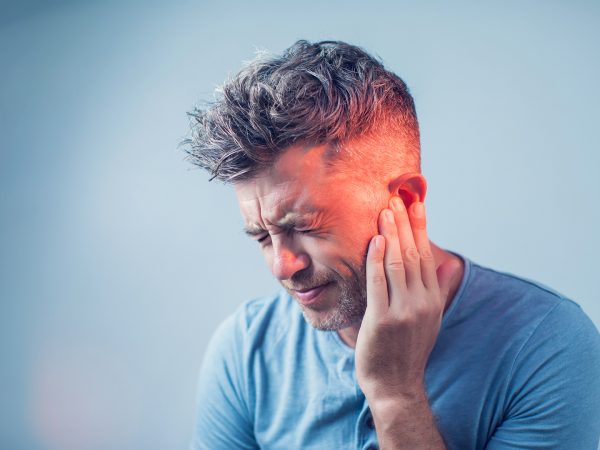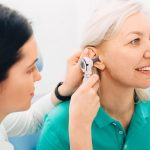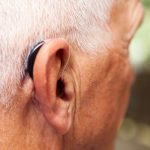Is There A Connection Between COVID And Tinnitus?
Does a diagnosis of Covid-19 increase the odds of developing or worsening this debilitating disorder?
Andrew Weil, M.D. | November 2, 2021

Tinnitus – a condition that creates the sensation of ringing, whooshing, or other noise with no external source causing it – can range from merely annoying to distracting to downright debilitating. There is no one cause of the condition; it is often associated with aging, noise-induced hearing loss, infection, or abnormal blood pressure. It can also be a side effect of some medications, including aspirin, and in some cases (in a subset called pulsatile tinnitus) the perceived noise can be the result of a narrowed vein in the head. The evidence so far is mixed about whether tinnitus can be brought on by Covid-19, or worsened by it.
Researchers started looking at the association between tinnitus and Covid-19 shortly after the pandemic began. One study in Italy in 2020 found that 43 of 185 patients studied (23 percent) reported experiencing new symptoms of tinnitus in the 30 to 60 days after a Covid-19 diagnosis.
A larger study of more than 3,000 patients with pre-existing tinnitus found that the Covid-19 pandemic exacerbated the condition in 32 percent of participants, even though the majority of those patients were never diagnosed with the virus. (Nearly two-thirds said their tinnitus was unaffected by the pandemic.) Of those who did experience symptoms of Covid-19, 58 percent said their tinnitus remained stable, and 40 percent said their tinnitus became significantly worse. Researchers concluded that stress, anxiety, and social isolation contributed greatly to the worsening of tinnitus in this patient group.
A year into the pandemic, an analysis published in the Journal of Clinical Medicine looked at dozens of papers that had been published about tinnitus and Covid-19 and found no patterns that suggested a medical connection between having had the virus and a worsening of the condition. Pandemic-related stress and anxiety were identified as the likely contributors to an exacerbation of symptoms.
Another review of research at the one-year mark looked at studies that investigated all audio-vestibular disorders associated with Covid-19 infection, including the possibility that they were side effects of medications used to treat the viral infection. That review found that hearing loss – both alone or in combination with tinnitus or vertigo – was the most common audio-vestibular complaint associated with Covid-19. Although the investigation did not establish a definitive link between the virus and tinnitus, it did suggest that it and other audio-vestibular disorders should be considered as possible manifestations of a Covid-19 infection.
Like so many other aspects of this virus, there is much we still don’t know for certain about its effects on hearing. It seems true that some people have had their tinnitus worsened by Covid-19 itself, or by the stress it has caused, and that others may have had tinnitus triggered by either the viral infection itself or by the hearing loss it caused. More research should help clarify the connection.
Andrew Weil, M.D.
Sources:
Viola P, Ralli M, Pisani D, Malanga D, Sculco D, Messina L, Laria C, Aragona T, Leopardi G, Ursini F, Scarpa A, Topazio D, Cama A, Vespertini V, Quintieri F, Cosco L, Cunsolo EM, Chiarella G. Tinnitus and equilibrium disorders in COVID-19 patients: preliminary results. Eur Arch Otorhinolaryngol. 2021 Oct;278(10):3725-3730. doi: 10.1007/s00405-020-06440-7. Epub 2020 Oct 23. PMID: 33095432; PMCID: PMC7582442. https://pubmed.ncbi.nlm.nih.gov/33095432/
Beukes EW, Baguley DM, Jacquemin L, Lourenco MPCG, Allen PM, Onozuka J, Stockdale D, Kaldo V, Andersson G, Manchaiah V. Changes in Tinnitus Experiences During the COVID-19 Pandemic. Front Public Health. 2020 Nov 5;8:592878. doi: 10.3389/fpubh.2020.592878. PMID: 33251179; PMCID: PMC7676491. https://pubmed.ncbi.nlm.nih.gov/33251179/
Beukes E, Ulep AJ, Eubank T, Manchaiah V. The Impact of COVID-19 and the Pandemic on Tinnitus: A Systematic Review. J Clin Med. 2021 Jun 23;10(13):2763. doi: 10.3390/jcm10132763. PMID: 34201831; PMCID: PMC8268057. https://pubmed.ncbi.nlm.nih.gov/34201831/
Fancello, Virginia et al. “SARS-CoV-2 (COVID-19) and audio-vestibular disorders.” International journal of immunopathology and pharmacology vol. 35 (2021): 20587384211027373. doi:10.1177/20587384211027373 https://www.ncbi.nlm.nih.gov/pmc/articles/PMC8216371/












